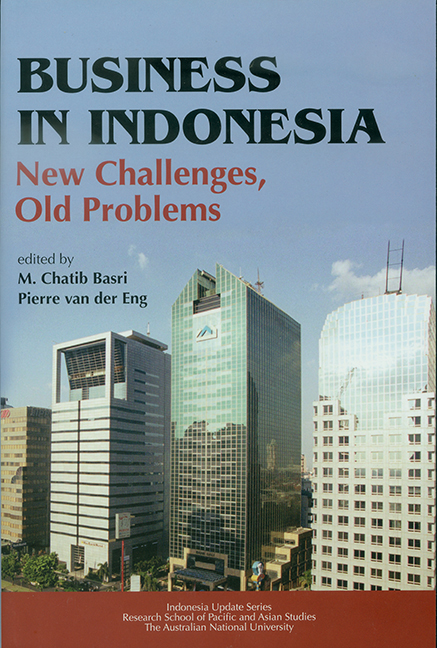Book contents
- Frontmatter
- Contents
- Tables
- Figures
- Contributors
- Acknowledgments
- Glossary
- 1 Business in Indonesia: Old Problems and New Challenges
- PART I Political and Economic Developments
- PART II Overview of the Business Environment
- PART III Foreign Investment and Trade
- PART IV Key Issues in the Business Environment
- 8 The Effects of Decentralisation on Business in Indonesia
- 9 Political Economy of Privatisation of State-owned Enterprises in Indonesia
- 10 Corporate Ownership and Management in Indonesia: Does It Change?
- 11 Tinkering Around the Edges: Inadequacy of Corporate Governance Reform in Post-Crisis Indonesia
- 12 Upholding Indonesian Bankruptcy Legislation
- 13 The Private Sector Response to Public Sector Corruption
- 14 A Challenge for Business? Developments in Indonesian Trade Unionism after Soeharto
- 15 Labour Regulation and the Business Environment: Time to Take Stock
- References
- Index
- Indonesia Update Series
14 - A Challenge for Business? Developments in Indonesian Trade Unionism after Soeharto
from PART IV - Key Issues in the Business Environment
Published online by Cambridge University Press: 21 October 2015
- Frontmatter
- Contents
- Tables
- Figures
- Contributors
- Acknowledgments
- Glossary
- 1 Business in Indonesia: Old Problems and New Challenges
- PART I Political and Economic Developments
- PART II Overview of the Business Environment
- PART III Foreign Investment and Trade
- PART IV Key Issues in the Business Environment
- 8 The Effects of Decentralisation on Business in Indonesia
- 9 Political Economy of Privatisation of State-owned Enterprises in Indonesia
- 10 Corporate Ownership and Management in Indonesia: Does It Change?
- 11 Tinkering Around the Edges: Inadequacy of Corporate Governance Reform in Post-Crisis Indonesia
- 12 Upholding Indonesian Bankruptcy Legislation
- 13 The Private Sector Response to Public Sector Corruption
- 14 A Challenge for Business? Developments in Indonesian Trade Unionism after Soeharto
- 15 Labour Regulation and the Business Environment: Time to Take Stock
- References
- Index
- Indonesia Update Series
Summary
In post-Soeharto Indonesia, ‘militant unionism’ – along with shrinking credit, the uncertain political climate and inconsistencies within the regulatory environment – has been identified as a major reason for foreign capital flight and domestic firm closures (Sadli 2000). Claims about the deleterious effects of worker militancy have been a focus of extensive press coverage as well as seminars, government statements and discussions among business, union and NGO think-tanks.1 Indeed, the relationship between labour activism and Indonesia's economic wellbeing has become an influential contextual factor in the development of the Indonesian industrial relations system.
This chapter discusses debates on unionism and business from a labour movement perspective. It begins by briefly outlining developments in unionism in New Order Indonesia and sketching changes in the regulatory environment and union activity in the first five years after the fall of Soeharto, before turning to the central question regarding the extent to which ‘militant’ unionism has been a challenge to business. It argues that, while the new industrial relations climate does indeed present challenges for employers, those challenges lie in developing effective mechanisms through which they can work with unions rather than in the spectre of a strong and militant labour movement bent on the destruction of business.
UNIONISM IN NEW ORDER INDONESIA
Indonesia has a long and rich history of organised labour. Efforts to mobilise workers have been documented since the late 19th century, and labour organisations played an important role in the nationalist movement in the late colonial period (to 1945) and under Indonesia's first President, Sukarno (1945–67). Organised labour entered a new phase when Soeharto's New Order regime started to take shape in 1966–67 after an attempted coup and the ensuing massacre of Indonesians associated with the Indonesian Communist Party (PKI) and other leftist groups. Building on the concepts of functional groups formulated during the Guided Democracy period (1959–65), the New Order government introduced the idea of Pancasila Industrial Relations – a corporatist system of industrial relations ostensibly built on the ‘family principle’ and the ‘traditional’ values of ‘mutual help’ and ‘deliberation to reach a consensus’ (see Ford 1999, 2000). As part of its attempt to corporatise the representation of labour, the New Order encouraged unionists who had survived the purges to establish the All-Indonesia Labour Federation (FBSI), a single peak body comprising 21 industrial sector unions (Hadiz 1997).
- Type
- Chapter
- Information
- Business in IndonesiaNew Challenges, Old Problems, pp. 221 - 233Publisher: ISEAS–Yusof Ishak InstitutePrint publication year: 2004

